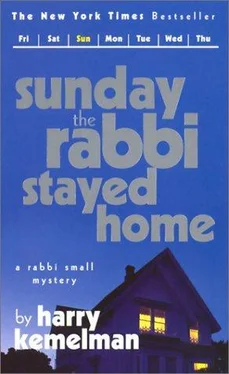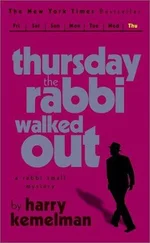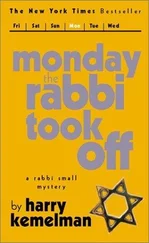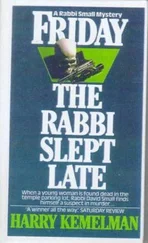Harry Kemelman - Sunday the Rabbi Stayed Home
Здесь есть возможность читать онлайн «Harry Kemelman - Sunday the Rabbi Stayed Home» весь текст электронной книги совершенно бесплатно (целиком полную версию без сокращений). В некоторых случаях можно слушать аудио, скачать через торрент в формате fb2 и присутствует краткое содержание. Город: New York, Год выпуска: 2002, ISBN: 2002, Издательство: iBooks, Жанр: Иронический детектив, на английском языке. Описание произведения, (предисловие) а так же отзывы посетителей доступны на портале библиотеки ЛибКат.
- Название:Sunday the Rabbi Stayed Home
- Автор:
- Издательство:iBooks
- Жанр:
- Год:2002
- Город:New York
- ISBN:978-0743452380
- Рейтинг книги:3 / 5. Голосов: 1
-
Избранное:Добавить в избранное
- Отзывы:
-
Ваша оценка:
- 60
- 1
- 2
- 3
- 4
- 5
Sunday the Rabbi Stayed Home: краткое содержание, описание и аннотация
Предлагаем к чтению аннотацию, описание, краткое содержание или предисловие (зависит от того, что написал сам автор книги «Sunday the Rabbi Stayed Home»). Если вы не нашли необходимую информацию о книге — напишите в комментариях, мы постараемся отыскать её.
Sunday the Rabbi Stayed Home — читать онлайн бесплатно полную книгу (весь текст) целиком
Ниже представлен текст книги, разбитый по страницам. Система сохранения места последней прочитанной страницы, позволяет с удобством читать онлайн бесплатно книгу «Sunday the Rabbi Stayed Home», без необходимости каждый раз заново искать на чём Вы остановились. Поставьте закладку, и сможете в любой момент перейти на страницу, на которой закончили чтение.
Интервал:
Закладка:
All week long the Small household had been busy with the cleaning and scrubbing and lining of shelves and cupboards that were normal preparation for the Passover week. The rabbi helped as much as possible, bringing up the rickety ladder from the basement and handing down to Miriam the stacks of Passover dishes and utensils that were kept on the topmost shelf of the cupboard for use only during the Passover week. The brunt of the work naturally fell on Miriam, and this year it was even more difficult, because Jonathan was old enough to follow her around and get in the way and continually demand attention. But finally, Saturday night, they had finished. While Miriam luxuriated on the living room couch the rabbi, followed step by step by his young son, had gone about the ritual symbolic search for the chometz, the crumbs of leaven left lying around on purpose to be found by candlelight, and with a feather swept onto a wooden spoon, which would be burned the next morning.
“Do you want me to take Jonathan off your hands. David?” Miriam called to him, with no real thought her offer would be accepted.
“Oh no. I always helped my father search for the chometz when I was a youngster. Kids like it. Do you remember where I put the candle and the—never mind. I’ve got them.” He recited the benediction. “Blessed art Thou. O Lord… Who commanded us to remove the leaven.” and then as his small son watched wide—eyed, by the flickering light of his candle he swept the leaven from the shelf where it had been previously placed and wrapped it in a bit of cloth and put it aside. He recited the ancient formula: “All manner of leaven that is in my possession which I have not seen or removed shall be null and accounted as the dust of the earth.”
“Tomorrow.” he said to Jonathan, “you can watch us burn it” And he called to his wife and asked her to get him ready for bed. Mr. Epstein was due any moment.
The rabbi shook his head. “I’m sorry, Mr. Epstein. I know you mean well, but I think you’re making a serious mistake—”
“I don’t understand. Rabbi. We’ve got to help Alan Jenkins the best way we can. We’re involved. My Didi invited him, and all the kids there were our kids.”
“Then why don’t you force the jail?”
“That’s ridiculous, Rabbi.”
“Precisely. And yet that would really help him. What I’m saying is that not all well-meaning actions necessarily result in the greatest good. You tell me that you have engaged this Donohue to act for him. I’ve heard of him, who hasn’t? And now you tell me he’s going to demand a change of venue on the grounds that the young man can’t get a fair trial in this community? Well. I don’t want the Jewish community to go on record as doubting the good faith of the town. We have been here for some years now, and there has never been anything to suggest that. But I’ll tell you what your action does suggest. It suggests that you’re pretty sure that Jenkins is guilty. If he is, he should be convicted, but until all the evidence is in, I for one intend to keep an open mind.”
“But this change of venue—that’s just a standard tactic.”
“Yes, but what you consider a standard tactic someone else might regard as an unfair tactic. That’s what’s wrong with your whole social action concept, if I may say so. You’re not satisfied with doing what you can; you must have everyone else in the temple doing it, too. Our religion has an ethical code, a guideline for conduct, Mr. Epstein, but it is the individual who implements it according to the dictates of his conscience and his own intelligence. One person may join a picket line and another no less interested in the same cause may feel better results are to be gained through the courts or private negotiations or by making contributions. It is a matter for the individual to decide. Even in our services we pray as individuals rather than in a chorus. You can mount a campaign and make a plea for funds, but so long as a single member of the congregation opposes, you have no right to make it in the name of the temple, regardless of how big a majority you can muster on the board of directors.”
“I don’t understand you, David.” Miriam pressed her fist against her mouth, as though to stifle harsh words of reproof. “He came to make amends. He was trying so hard to effect a reconciliation. And he’s a good man.”
“Of course, he’s a good man. And so are Gorfinkle and the rest of them. They’re all good men, or they wouldn’t be so concerned about what may happen to a poor Negro that stumbled into a mess of trouble. But goodness is not enough. The people who took part in the religious wars were good men, but they killed and maimed in the tens of thousands nevertheless.”
“Oh, David, you’re so—so inflexible. Can’t you bend a little?”
He looked at her in surprise. “I bend when I have to, and I can. But I’ve got to be careful not to bend so far that I’ll fall over.”
Chapter Fifty-Five
On Sundays the minvan was held at nine instead of seven thirty, as it was on weekday mornings. Although it was a lovely day and he had plenty of time to walk, the rabbi took his car. He did not go directly to the temple, but drove along the shore, stopping once or twice along the way to enjoy the sight of the waves breaking against the rocks and the gulls swooping down low over the water.
The road hugged the shore and then fell away, and he looked ahead and realized that he was approaching Hillson House. He slowed down as he came abreast of it and for a moment thought of stopping to look around. But he saw a man standing at the window of the adjoining house, talking into a telephone, so he drove on.
He arrived just in time for the service. Sundays always drew a larger crowd, because many fathers who brought their children to the Sunday school attended the minvan for lack of anything better to do while waiting to take them home. Today the short service was followed by a collation, given by one of the regular members in honor of his daughter’s engagement.
They stood around, sipping their tea or coffee, munching cake and cookies, unleavened, of course, in keeping with the Passover regulation, since the holiday began that evening. Arthur Nussbaum was there, still pushing his pet project. “Look, fellows. I tell you it makes no sense to keep all that dough just sitting in a bank—”
“It’s earning interest, isn’t it?”
“So every year costs go up twice as much. Sooner or later, everybody knows we’re going to change those seats. If we had gone ahead when the money was first left to us, we could have done half the sanctuary, right up to the center aisle. This year the money probably wouldn’t cover more than a third.”
“Yeah, fat chance of having some seats of one kind and the rest another. It will look terrible. The women will raise Cain.”
“Let ’em. Don’t you see,” Nussbaum urged, “if they think it looks funny, they’ll work all the harder to get the rest put in.”
“Yeah? Well, if you think there was a stink about permanent seating, just wait till the first third of the sanctuary is fancied up with one kind of seat—”
The rabbi, who was standing nearby., murmured. “So why does it have to be the first third? Why not start replacing the seats from the rear?” He spotted Paff leaving the chapel and excused himself.
Nussbaum overheard the remark and repeated it to the others.
“Is he kidding?”
“That would be even worse. That would guarantee getting everyone sore.”
“Not as sore as our present seats.” said Dr. Edelstein. “You put padded seats in back, and you can put me down for one right now.”
Irving Kallen nodded. “You may have something at that, Doc. For me I don’t care. I’m well-padded, but my old man, I’d bet he’d really appreciate it.”
Читать дальшеИнтервал:
Закладка:
Похожие книги на «Sunday the Rabbi Stayed Home»
Представляем Вашему вниманию похожие книги на «Sunday the Rabbi Stayed Home» списком для выбора. Мы отобрали схожую по названию и смыслу литературу в надежде предоставить читателям больше вариантов отыскать новые, интересные, ещё непрочитанные произведения.
Обсуждение, отзывы о книге «Sunday the Rabbi Stayed Home» и просто собственные мнения читателей. Оставьте ваши комментарии, напишите, что Вы думаете о произведении, его смысле или главных героях. Укажите что конкретно понравилось, а что нет, и почему Вы так считаете.












